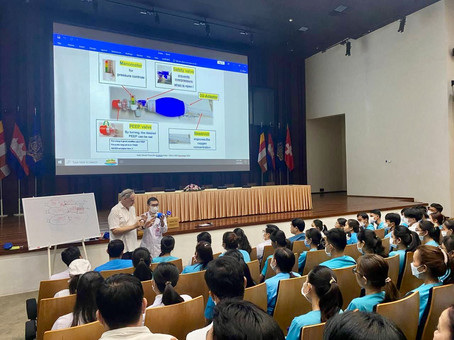Kantha Bopha is Initiating National Project
- stiftungkanthaboph
- Feb 20, 2025
- 4 min read

Many children in Cambodia are born at home, some in local health centres or regional hospitals. When complications arise, the mothers and their babies are often brought to our hospitals in Kantha Bopha. By the time they arrive, they are usually in very serious to critical condition because they have not been cared for and transported with the necessary expertise.
To improve the situation for mothers and newborns, Jean-Claude Fauchère has launched a new national project: start4newborn Cambodia. The neonatologist from Zurich has been training our neonatology teams in Kantha Bopha hospitals since 2017, developing important standards with them and has a wealth of experience in this field. 15 years ago, he implemented a similar project for newborns in Switzerland: he was commissioned by the Swiss Society of Neonatology - together with a national work group - to standardise the practical care of newborns with adaptation disorders at birth (www.paediatrieschweiz.ch/start4neo).
This has been achieved by regularly adapting national recommendations for neonatal care at birth and by introducing a nationwide practical course called start4neo. This is an interdisciplinary course that teaches, develops, and trains the necessary practical and communication skills. The target group includes all professionals who care for newborns at birth: midwives, paediatricians and anaesthetists, obstetricians, and paramedics.
The neonatologist has now launched a similar project in Cambodia. What does he want to achieve with this nationwide campaign? What roles do Switzerland and our hospitals play in this? We wanted to know.

Mr Fauchère, what exactly is this project?
I mentioned the Swiss start4neo course a few years ago during a tour of the neonatology unit in Phnom Penh, in the presence of the hospital management and representatives of the Ministry of Health, in view of the often very rudimentary care of newborns with health problems in Cambodia. These are mainly newborns who have suffered from oxygen deprivation at birth: It is vital that this situation is remedied quickly to minimise the risk of lifelong disability or even death. There are also significant numbers of premature and congenitally deformed babies.
What needs to be done to improve the treatment of these babies?
A 'needs assessment' of the situation in Cambodia must be carried out: What is needed from a wider perspective, what do the professionals involved need? This will result in a catalogue of skills to be learnt, tailored to the situation in Cambodia. Furthermore, a budget needs to be drawn up for the project, including teaching materials, staff, and travel costs for all participants. Of course, funding has to be secured. Then the best possible course structure needs to be developed, both content-related and didactically. This includes the content and didactics for each module, whether the courses will be held in the central hospitals and/or decentralised in the peripheral hospitals, the training of instructors and regular evaluation by participants and instructors, and feedback to a steering group with adjustments to the start4newborn Cambodia course.
What do you hope for, what can start4newborn achieve?
Standardised care guidelines will be introduced, first locally and then nationally. This will significantly improve the quality of care and transport for newborns with adaptation problems. Communication between decentralised birth centres and clinics, health centres and central hospitals will improve. All this will lead to a significant reduction in neonatal mortality and long-term disability, improve the quality of life of surviving children - and In the long run, this will lead to lower costs for both families and the state. The fact that these results can be achieved at a relatively moderate cost is another very positive aspect.
How far along is the project?
A steering group was formed around Secretary of State and Professor Im Sethikar - who, incidentally, used to work in neonatology at Kantha Bopha Hospitals. The actual launch took place in May 2024 at an opening symposium at Calmette Hospital in Phnom Penh, attended by the Cambodian Minister of Health, his staff, the steering and work groups, and around a hundred local and online participants. The start4newborn Cambodia project was presented, and official support from the Ministry of Health was assured. A hands-on training session took place in the afternoon.
What are the next steps?
The work group now has the task of translating into Khmer the theory manuscript we provided from Switzerland and translated into English, organising the content of the four to five course modules, providing didactic material, selecting future instructors, and proposing course modalities.
Who is involved?
The Calmette Hospital in Phnom Penh and our children's hospitals in Kantha Bopha are in charge of the project, together with the Soviet Khmer Hospital in Phnom Penh. Dr Rathmony Heng is the head of neonatology at Calmette Hospital and leads the working group, while the two head neonatologists from Siem Reap and Phnom Penh, Dr Bunthong Sar and Dr Peou Kim, are helping from our side. Professor Sethikar is also a representative of the Ministry of Health and, as President of the Perinatal Society of Cambodia (PSC), is responsible for managing the project.
Professor Sethikar has nominated you for the title of "Honorary Advisor to the Ministry of Health". What does this title mean to you?
As the name suggests, the title is purely honorary. From my point of view, the only significance is that as a representative of Kantha Bopha, I can make our important partnership in this national project visible at all levels. The neonatology unit in our hospitals is by far the largest in the country in terms of numbers and the most advanced in terms of expertise and technology. It can be considered a pioneer in Cambodia.
And what is your further personal commitment to start4newborn?
I will be travelling to Phnom Penh in June 2025 together with Cécile Keller, a teaching nurse in neonatology at the University Hospital of Zurich. In addition to other teaching topics in the various neonatal units, we will discuss the current status with the start4newborn project team and Professor Sethikar, formulate further goals and answer questions. We would like to start training instructors for the courses this year, find suitable candidates, and organise a first pilot course. We can then build on this experience.












Comments